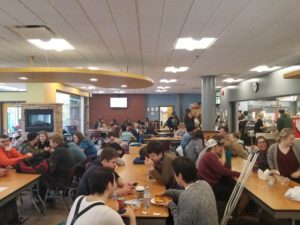The Camosun College Student Society (CCSS) is preparing for its annual spring election, which will be held from April 8 to April 10. Students will vote online for the executive constituency positions of the CCSS as well as any vacant campus director positions. Camosun College holds its electoral process simultaneously with the CCSS, so students can also elect their student board of governor and education council representatives.
CCSS executive director Michel Turcotte says that the change to an online voting system has made it easier for students to participate in the CCSS elections. The online platform has increased voter turnout and also made the process of counting votes more efficient.
“Well, voter turnout has increased since we moved to online voting,” says Turcotte. “I mean, it’s still not what you would like to get in a municipal election. A municipal election, about 30 percent of people tend to vote, sometimes; the last municipal election was a bit more contentious, so you had more than that, but on average about 30 percent of people vote. I would love it if 30 percent of student society members [Camosun students] voted. 10 percent still allows democracy to take place, and it is likely close to what we would be expecting, although I encourage every Camosun student to [vote], and since we don’t have to physically count ballots I think it’s a great thing if they all voted.”

Turcotte says that voting is important for students because it’s participating in democracy. There are resources available through organizations like the CCSS that students benefit from, he says, and being aware of those benefits is an important factor in making sure resources are being used effectively.
“Where you want democracy to work, it requires participation from the voters, and more than participation, it requires engagement,” says Turcotte. “The same thing applies for the student society. The student society actually has some influence on things that impact students, and sometimes, unfortunately, students aren’t aware of that, but there’s a fair bit of money that flows through the student society. There’s the programs like the universal bus pass, the health and dental; those sort of things are also run through the student society. There’s advocacy and a constituency of representatives in a number of programs and services that the student society offers. But it also requires accountability, and accountability comes from having a board of directors that’s elected by members of the society. If students want to ensure that the money that they are spending is allocated and spent in an accountable way, the best way is to get involved and at least participate in the elections.”
CCSS external executive Fillette Umulisa says that participation in student elections is important because the people who are elected will be acting as student representatives.
“Students should vote because their vote is going to count towards a greater cause,” says Umulisa. “So if you vote, that’s the first step towards voicing your concerns. The people that you vote for will make sure that your concerns are heard and work to accommodate your concerns or to make things better for you. They’re going to be your advocates. They’re going to be your student representatives. So people should vote because you’re putting people in power to make decisions on your behalf—you might as well know who they are. So vote for them. Trust them with your vote.”
First year Hospitality Management student Tom Adam says that between work and school he doesn’t have time to seek out enough information to form an opinion about student elections.
“We just come to class and leave at the end. I don’t know much about it, really,” says Adam. “Between work and school I definitely am not seeking out information, to be honest. I wouldn’t know who to vote for or what the issues are.”
First year University Transfer student Preston Forry says that because he plans to transfer to another school, he feels that his opinion is not as relevant to the student society.
“I kind of noticed it last year that I was here, there was banners up for elections and whatnot, but I didn’t vote or anything because I knew I was only going to be here for a year, so I didn’t think my say mattered as much,” says Forry.
Cheyenne Adrian, who is in her first year of Camosun Nursing prerequisites, says that researching student elections feels like one more thing for students to learn.
“I don’t know anything about it. I mean, I feel like I have to figure that stuff out on my own, and I feel like I shouldn’t,” says Adrian. “I have no idea; I honestly have no input on that. I wish I did. I mean, I guess when I think about it, it seems like something else to do, something else to hear about, something else to know. I wouldn’t say I have input on it.”
Turcotte says that student participation in campus elections is affected by a general impression that the student society has little impact on students. The pre-existing responsibilities of students also have a big impact on voter turnout.
“There’s a perception that the student society doesn’t have a huge impact on them,” says Turcotte. “And therefore, when it comes to the importance of paying attention to things, people let things drop. That happens municipally—federal elections have a far better voter turnout rate than a municipal election—because people sense those things as being important, and more important because of the higher level of government. The other thing is students just have a lot on their plate nowadays—jobs, and their studies, and families, and all those sorts of things. It’s easy to not pay attention to other things unless you feel it actually impacts you directly, and until you have a problem at Camosun some people don’t even realize the student society exists.”
